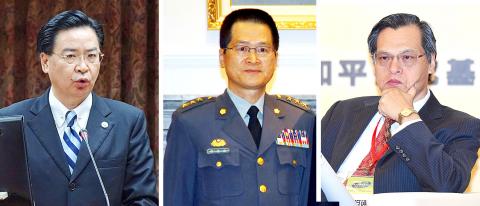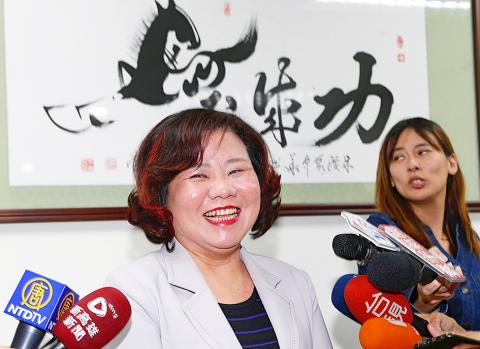President Tsai Ing-wen’s (蔡英文) administration yesterday announced a reshuffle of its top national security, foreign affairs and cross-strait officials.
Presidential Office Secretary-General Joseph Wu (吳釗燮) is to replace Minister of Foreign Affairs David Lee (李大維), who is to fill a vacancy left by National Security Council Secretary-General Yan Te-fa (嚴德發) after Yan becomes the minister of national defense.
Mainland Affairs Council (MAC) Minister Katharine Chang (張小月) is to be replaced by Chen Min-tong (陳明通), a professor at National Taiwan University’s Graduate Institute of National Development who headed the council from 2007 to 2008.

Photos: Taipei Times and CNA
Due to health issues, Minister of Labor Lin Mei-chu (林美珠) is to leave her post and be succeeded by Kaohsiung Deputy Mayor Hsu Ming-chun (許銘春), while former chief of the general staff Chiu Kuo-cheng (邱國正) is to take over the Veterans Affairs Council after Director Lee Shying-jow (李翔宙) departs.
Chang, Lee Shying-jow and Minister of National Defense Feng Shih-kuan (馮世寬) are to be appointed to new posts, Executive Yuan spokesman Hsu Kuo-yung (徐國勇) said, without providing further details.
However, media reports said that Feng is to assume the presidency of a government-funded national security think tank, which is expected to become operational in May.

Photo: CNA
The personnel changes are scheduled to take effect on Monday, with the exception of Chen, who has to handle school matters first and would not report for duty until the middle of next month, Hsu Kuo-yung said
MAC Deputy Minister Lin Cheng-yi (林正義) is to step in for Chen in the meantime, he added.
Regarding Wu’s successor, Presidential Office spokesman Alex Huang (黃重諺) downplayed speculation that it would be Kaohsiung Mayor Chen Chu (陳菊), saying only that the matter has yet to be determined and would be announced as soon as a decision is made.
Given that the reshuffle mostly pertained to the president’s mandates on foreign affairs, national defense and cross-strait ties, the lineup was not finalized until a meeting between Tsai and Premier William Lai (賴清德) at 1:30pm yesterday, Huang said.
As some ministers who would reportedly be replaced were not included in the reorganization, such as Minister of Education Pan Wen-chung (潘文忠) and Minister of the Interior Yeh Jiunn-rong (葉俊榮), there was speculation in the media over whether another reshuffle could occur after May 20, the second anniversary of Tsai’s inauguration.
There were no leadership changes in government agencies overseen by Lai — other than Lin Mei-chu — because of good teamwork between the premier and those Cabinet members, Hsu Kuo-yung said.
“The premier also felt that his team’s momentum has not only not slackened since he assumed the premiership on Sept. 8 last year, but has continued in an upward direction,” Hsu Kuo-yung said, adding that any speculation of a reshuffle was unfair to the hardworking ministers.
Nevertheless, he declined to personally guarantee the other ministers’ jobs would be safe when asked, saying that politically appointed officials should always be prepared to leave.
In response to a reporter’s question on whether Wu’s appointment as foreign minister constituted a demotion, he said that Wu’s current and future posts are all minister-level positions.
Wu, a long-time trusted aide of Tsai on international and security affairs, served as the nation’s representative to the US, as well as Democratic Progressive Party secretary-general under Tsai’s party leadership from May 2014 to May 2016, when she campaigned for the presidency.
Following Tsai’s inauguration as president, Wu was put in charge of the top national security body before being transferred to his current post in May last year.

Intelligence agents have recorded 510,000 instances of “controversial information” being spread online by the Chinese Communist Party (CCP) so far this year, the National Security Bureau (NSB) said in a report yesterday, as it warned of artificial intelligence (AI) being employed to generate destabilizing misinformation. The bureau submitted a written report to the Legislative Yuan in preparation for National Security Bureau Director-General Tsai Ming-yen’s (蔡明彥) appearance before the Foreign Affairs and National Defense Committee today. The CCP has been using cognitive warfare to divide Taiwanese society by commenting on controversial issues such as Taiwan Semiconductor Manufacturing Co’s (TSMC, 台積電) investments in the

INVESTIGATION: The case is the latest instance of a DPP figure being implicated in an espionage network accused of allegedly leaking information to Chinese intelligence Democratic Progressive Party (DPP) member Ho Jen-chieh (何仁傑) was detained and held incommunicado yesterday on suspicion of spying for China during his tenure as assistant to then-minister of foreign affairs Joseph Wu (吳釗燮). The Taipei District Prosecutors’ Office said Ho was implicated during its investigation into alleged spying activities by former Presidential Office consultant Wu Shang-yu (吳尚雨). Prosecutors said there is reason to believe Ho breached the National Security Act (國家安全法) by leaking classified Ministry of Foreign Affairs information to Chinese intelligence. Following interrogation, prosecutors petitioned the Taipei District Court to detain Ho, citing concerns over potential collusion or tampering of evidence. The

‘COMPREHENSIVE PLAN’: Lin Chia-lung said that the government was ready to talk about a variety of issues, including investment in and purchases from the US The National Stabilization Fund (NSF) yesterday announced that it would step in to staunch stock market losses for the ninth time in the nation’s history. An NSF board meeting, originally scheduled for Monday next week, was moved to yesterday after stocks plummeted in the wake of US President Donald Trump’s announcement of 32 percent tariffs on Taiwan on Wednesday last week. Board members voted to support the stock market with the NT$500 billion (US$15.15 billion) fund, with injections of funds to begin as soon as today. The NSF in 2000 injected NT$120 billion to stabilize stocks, the most ever. The lowest amount it

NEGOTIATIONS: Taiwan has good relations with Washington and the outlook for the negotiations looks promising, Minister of Economic Affairs J.W. Kuo said Taiwan’s GDP growth this year is expected to decrease by 0.43 to 1.61 percentage points due to the effects of US tariffs, National Development Council (NDC) Minister Paul Liu (劉鏡清) said at a meeting of the legislature’s Economics Committee in Taipei yesterday, citing a preliminary estimate by a private research institution. Taiwan’s economy would be significantly affected by the 32 percent “reciprocal” tariffs slapped by the US, which took effect yesterday, Liu said, adding that GDP growth could fall below 3 percent and potentially even dip below 2 percent to 1.53 percent this year. The council has commissioned another institution